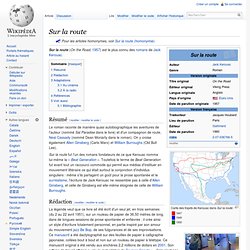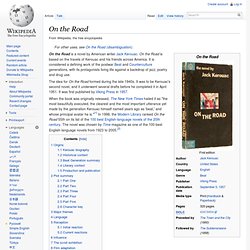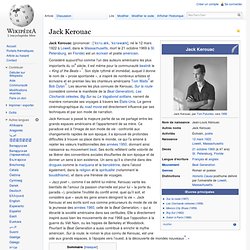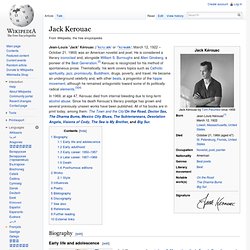

Bande-annonce Sur la route - Sur la route Bande-annonce VF. Kerouac. Sur la route. Un article de Wikipédia, l'encyclopédie libre.

Résumé[modifier | modifier le code] Carte des trajets de Kerouac dans Sur la route: 1947 1949 1950 Le roman raconte de manière quasi autobiographique les aventures de l'auteur (nommé Sal Paradise dans le livre) et d'un compagnon de route, Neal Cassady (nommé Dean Moriarty dans le roman). On y croise également Allen Ginsberg (Carlo Marx) et William Burroughs (Old Bull Lee).
Sur la route fut l'un des romans fondateurs de ce que Kerouac nomma lui-même la « Beat Generation ». Rédaction[modifier | modifier le code] La légende veut que ce livre ait été écrit d'un seul jet, en trois semaines (du 2 au 22 avril 1951), sur un rouleau de papier de 36,50 mètres de long, dans de longues sessions de prose spontanée et enfiévrée ; il crée ainsi un style d'écriture totalement personnel, en partie inspiré par son amour du mouvement jazz Be Bop, de ses fulgurances et de ses improvisations.
Adaptations[modifier | modifier le code] On the Road. On the Road is a novel by American writer Jack Kerouac.

On the Road is based on the travels of Kerouac and his friends across America. It is considered a defining work of the postwar Beat and Counterculture generations, with its protagonists living life against a backdrop of jazz, poetry and drug use. The idea for On the Road formed during the late 1940s. It was to be Kerouac's second novel, and it underwent several drafts before he completed it in April 1951.
It was first published by Viking Press in 1957. Origins[edit] Many aspects go into understanding the context of On the Road, and they must be viewed cohesively in order to appreciate why the book was as relevant and pertinent as it was. Jack Kerouac. Un article de Wikipédia, l'encyclopédie libre.

Jack Kerouac a passé la majeure partie de sa vie partagé entre les grands espaces américains et l'appartement de sa mère. Ce paradoxe est à l'image de son mode de vie : confronté aux changements rapides de son époque, il a éprouvé de profondes difficultés à trouver sa place dans le monde, ce qui l'a amené à rejeter les valeurs traditionnelles des années 1950, donnant ainsi naissance au mouvement beat. Ses écrits reflètent cette volonté de se libérer des conventions sociales étouffantes de son époque et de donner un sens à son existence.
Un sens qu'il a cherché dans des drogues comme la marijuana et la benzédrine, dans l'alcool également, dans la religion et la spiritualité (notamment le bouddhisme), et dans une frénésie de voyages. Biographie[modifier | modifier le code] Premières années[modifier | modifier le code] Grâce à l'activité de son père, Jack Kerouac est introduit dans le milieu culturel et littéraire de la ville. Museedeslettres. Jack Kerouac « L.K. Thayer's Poetry Juice Bar. Jack-kerouac. 10293579-large. Jack Kerouac. Jean-Louis "Jack" Kérouac (/ˈkɛruːæk/ or /ˈkɛrɵæk/; March 12, 1922 – October 21, 1969) was an American novelist and poet.

He is considered a literary iconoclast and, alongside William S. Burroughs and Allen Ginsberg, a pioneer of the Beat Generation.[2] Kerouac is recognized for his method of spontaneous prose. Thematically, his work covers topics such as Catholic spirituality, jazz, promiscuity, Buddhism, drugs, poverty, and travel. He became an underground celebrity and, with other beats, a progenitor of the hippie movement, although he remained antagonistic toward some of its politically radical elements.[3][4] Biography[edit] Early life and adolescence[edit] Jack Kerouac was born on 9 Lupine Road in the West Centralville section of Lowell Massachusetts, 2nd floor. Jack Kerouac was born in Lowell, Massachusetts, to French-Canadian parents, Léo-Alcide Kéroack and Gabrielle-Ange Lévesque, of St-Hubert-de-Rivière-du-Loup in the province of Quebec, Canada.
Early adulthood[edit]